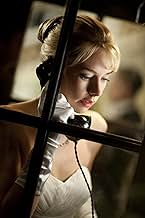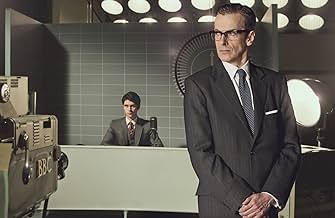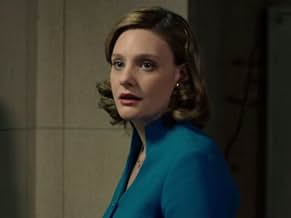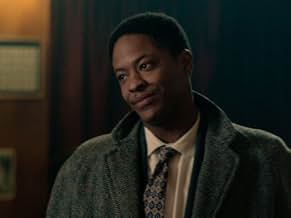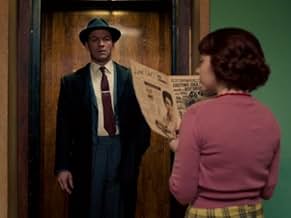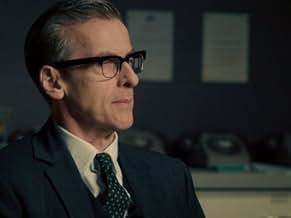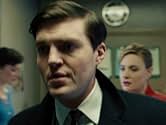Ein Hinter-den-Kulissen-Drama und Spionage-Thriller im England der Zeit des Kalten Krieges, in dessen Mittelpunkt ein Journalist, ein Produzent und ein Moderator einer investigativen Nachric... Alles lesenEin Hinter-den-Kulissen-Drama und Spionage-Thriller im England der Zeit des Kalten Krieges, in dessen Mittelpunkt ein Journalist, ein Produzent und ein Moderator einer investigativen Nachrichtensendung stehen.Ein Hinter-den-Kulissen-Drama und Spionage-Thriller im England der Zeit des Kalten Krieges, in dessen Mittelpunkt ein Journalist, ein Produzent und ein Moderator einer investigativen Nachrichtensendung stehen.
- 1 Primetime Emmy gewonnen
- 4 Gewinne & 45 Nominierungen insgesamt
Folgen durchsuchen
Empfohlene Bewertungen
The Hour is an intriguing new drama, created and written by Abi Morgan, that spans several genres and weaves them together cleverly and effectively. There is espionage, murder and suspense on the one hand; romance on another hand; comedy on yet another hand; and political drama on the final hand. The central emphasis is on the characters, however, of Bel Rowley (producer of The Hour), Hector Madden (its presenter), and one of the best characters of recent years, the funny and confident Freddie Lyon, one of the show's journalists.
The acting is uniformly excellent; Romola Garai ('Atonement'; 'The Crimson Petal and the White') and Ben Whishaw ('Perfume'; 'Criminal Justice I') especially shine as Bel and Freddie. There are other superb performances from the seedy Julian Rhind-Tutt ('Green Wing') and the suave Dominic West ('The Wire'), along with my personal favourite Anna Chancellor ('Four Weddings and a Funeral') as Lix, an acid-tongued feminist in the newsroom.
The story does start off a little slowly, but prepare for a roller-coaster ride later on, particularly in the extremely tense final episode, where the drama is perfectly pitched. The loose ends are nicely tied up, and the conclusion is suitably ambiguous, ready for the second series which has been commissioned.
The only quibble is the sometimes anachronistic dialogue; but one tends not to notice this as everything else is so good.
So, overall this is an intriguing, intelligent drama with plenty of strands, twists and turns, and fantastic acting all round. I await series two eagerly.
The acting is uniformly excellent; Romola Garai ('Atonement'; 'The Crimson Petal and the White') and Ben Whishaw ('Perfume'; 'Criminal Justice I') especially shine as Bel and Freddie. There are other superb performances from the seedy Julian Rhind-Tutt ('Green Wing') and the suave Dominic West ('The Wire'), along with my personal favourite Anna Chancellor ('Four Weddings and a Funeral') as Lix, an acid-tongued feminist in the newsroom.
The story does start off a little slowly, but prepare for a roller-coaster ride later on, particularly in the extremely tense final episode, where the drama is perfectly pitched. The loose ends are nicely tied up, and the conclusion is suitably ambiguous, ready for the second series which has been commissioned.
The only quibble is the sometimes anachronistic dialogue; but one tends not to notice this as everything else is so good.
So, overall this is an intriguing, intelligent drama with plenty of strands, twists and turns, and fantastic acting all round. I await series two eagerly.
Review of Series One:
This decent BBC drama miniseries depicts the lives and loves of three journalists working for the corporation during the 1950s. The series gets off to a dodgy start with the first couple of episodes, mainly because the main characters are all so damn cold. It then gets a lot better as we get to know those involved, and by the end it's become a real blast.
Romola Garai's Bel is really the centrepiece of the whole production, the producer who attempts to hold it all together while making some huge mistakes along the way. Ben Whishaw's Freddie is a bit of an oddball at first, but his deepening involvement with the series' conspiracy undertones makes him a character to watch and, come the finale, he's the most interesting by far. Dominic West is faultless, as he has been in everything I've seen him in.
The attention to detail is impeccable, and I particularly enjoyed the way that world-shaping events have a key influence on the plotting. There's romance, drama, murder and humour in spades here, along with strong performances from both veterans (Anna Chancellor, Juliet Stevenson, Tim Pigott-Smith) and relative newcomers (Burn Gorman and Julian Rhind-Tutt are both particularly good).
There are occasional faults – the unravelling of the conspiracy storyline is over-complicated and muddled – but these can be easily forgiven. Altogether a compelling piece of literate TV drama, and I'm overjoyed to hear a second series has been commissioned.
Review of Series Two:
Series two of THE HOUR turns out to be an improvement on the first series, which was great to begin with: the performances are more natural, the storyline more tightly focused, and the sense of danger and impending deadlines far more pronounced.
The series boasts impeccable production designs, intriguingly interwoven plotting and some excellent performances. In this series, Hector is really put through the wringer, allowing the audience some more of Dominic West's finely mannered acting; Oona Chaplin, playing Hector's wife, also comes into her own as a fully developed, sympathetic character for the first time.
There are casualties: Romola Garai is utilised less well here, although Ben Whishaw is as charming as ever. The problem is that the focus is away from Garai, unlike in the first series, and she's given little to do. Everyone else seems to have deeper, stronger character stuff, whereas her screen time is limited to some corny romance that never goes anywhere.
There are missteps, too, not least Abi Morgan's attempt to give ALL of the main characters some emotional storyline, even the nerdy bespectacled comic relief guy. There's just not room for it, and bringing in a typically hissy Peter Capaldi doesn't work either; his sub-plot with Anna Chancellor just left me cold, getting in the way of the REAL story.
Still, these flaws aren't enough to ruin the enjoyment of this series, which just seems to get better and better with each episode. As with series one, it culminates in a remarkably tense and gripping final episode that leaves me hoping for third outing.
This decent BBC drama miniseries depicts the lives and loves of three journalists working for the corporation during the 1950s. The series gets off to a dodgy start with the first couple of episodes, mainly because the main characters are all so damn cold. It then gets a lot better as we get to know those involved, and by the end it's become a real blast.
Romola Garai's Bel is really the centrepiece of the whole production, the producer who attempts to hold it all together while making some huge mistakes along the way. Ben Whishaw's Freddie is a bit of an oddball at first, but his deepening involvement with the series' conspiracy undertones makes him a character to watch and, come the finale, he's the most interesting by far. Dominic West is faultless, as he has been in everything I've seen him in.
The attention to detail is impeccable, and I particularly enjoyed the way that world-shaping events have a key influence on the plotting. There's romance, drama, murder and humour in spades here, along with strong performances from both veterans (Anna Chancellor, Juliet Stevenson, Tim Pigott-Smith) and relative newcomers (Burn Gorman and Julian Rhind-Tutt are both particularly good).
There are occasional faults – the unravelling of the conspiracy storyline is over-complicated and muddled – but these can be easily forgiven. Altogether a compelling piece of literate TV drama, and I'm overjoyed to hear a second series has been commissioned.
Review of Series Two:
Series two of THE HOUR turns out to be an improvement on the first series, which was great to begin with: the performances are more natural, the storyline more tightly focused, and the sense of danger and impending deadlines far more pronounced.
The series boasts impeccable production designs, intriguingly interwoven plotting and some excellent performances. In this series, Hector is really put through the wringer, allowing the audience some more of Dominic West's finely mannered acting; Oona Chaplin, playing Hector's wife, also comes into her own as a fully developed, sympathetic character for the first time.
There are casualties: Romola Garai is utilised less well here, although Ben Whishaw is as charming as ever. The problem is that the focus is away from Garai, unlike in the first series, and she's given little to do. Everyone else seems to have deeper, stronger character stuff, whereas her screen time is limited to some corny romance that never goes anywhere.
There are missteps, too, not least Abi Morgan's attempt to give ALL of the main characters some emotional storyline, even the nerdy bespectacled comic relief guy. There's just not room for it, and bringing in a typically hissy Peter Capaldi doesn't work either; his sub-plot with Anna Chancellor just left me cold, getting in the way of the REAL story.
Still, these flaws aren't enough to ruin the enjoyment of this series, which just seems to get better and better with each episode. As with series one, it culminates in a remarkably tense and gripping final episode that leaves me hoping for third outing.
Now available on disk from Netflix and streaming on Amazon Prime, this smart, stylish BBC series, set in the mid-50s, really hits its stride by the end of its first season. Sumptuous Bel and geeky Freddie (Romola Garai and Ben Wishaw), escapees from the BBC newsreel floor, are the offscreen talent behind the eponymous news program; Hector (Dominic West) is the hearty, "highly corruptible" frontman. The plot lines are a little over the top at times—Mr. Kish, the palefaced spook who self-destructs when he fails to hit the target, is straight out of the old "Avengers" series (not necessarily a bad thing)—but the interplay among the main characters is beautifully portrayed. Anna Chancellor and Peter Capaldi are great together as a pair of prickly ex-lovers, and Oona Chaplin, at first mainly decorative as Hector's neglected wife, has an amazing scene in which she kicks her latest rival to the curb in the kindest, gentlest way.
The first season is built around the Suez Crisis and the Burgess-Maclean spy scandal, but the political backdrop is pretty much self-explanatory; the second season reverts to more familiar hardboiled themes—bent cops, shady nightclubs, showgirls in jeopardy and a porno racket (innocuous b&w photos in this case)—before getting back to the big stuff, high-level corruption and the nuclear threat. A "behind the scenes" clip on the second DVD focuses on the obsessively detailed production design, which, as with "Mad Men," is a big part of the show's appeal.
The first season is built around the Suez Crisis and the Burgess-Maclean spy scandal, but the political backdrop is pretty much self-explanatory; the second season reverts to more familiar hardboiled themes—bent cops, shady nightclubs, showgirls in jeopardy and a porno racket (innocuous b&w photos in this case)—before getting back to the big stuff, high-level corruption and the nuclear threat. A "behind the scenes" clip on the second DVD focuses on the obsessively detailed production design, which, as with "Mad Men," is a big part of the show's appeal.
Fast moving, very well written show about spies and TV Broadcasting in 50's Britain. The cast is uniformly superlative both as individuals and collectively (sorry about the 'socialist' term - but it is 50's Britain)... sorry, 'Ensemble' is the word. All great down to the smallest parts. Excellent script, good period atmosphere, lighting, photography, set design. There's even some James Bond references which I think is premature but by 1956 Fleming had published three books.
I've never seen Mad Men so I can't relate to the comparisons and I have yet to see Series 2. I watched this on DVD (remember those?) in two 150 minute chunks and both parts held interest from start to finish. Outstanding.
I've never seen Mad Men so I can't relate to the comparisons and I have yet to see Series 2. I watched this on DVD (remember those?) in two 150 minute chunks and both parts held interest from start to finish. Outstanding.
Three times great may stand for the main cast of characters in this wonderful mini series by the BBC about the BBC, well done and professional as it is the house style. It brings you back to the old days of television in the mid-fifties by inviting us the watch the birth of a fictional weekly news magazine and the ups and downs of three journalists. One is a dynamic producer, trying hard to prove to herself and all others that she is worth the job, another a brilliant but difficult to work with intellectual lower class journalist, and finally a charming but eager to please and womanizing moderator. These three are not only connected through their work but simultaneously by friendship, love and hate. Together they get themselves into deep trouble and are bound to rely on each other when things get worse. The story draws us into a forgotten world of secrets, espionage and crisis, all through the eyes of the fifties! Both seasons are excellently done, rich of details and exciting facts.
Wusstest du schon
- WissenswertesBel and Freddie often call each other Moneypenny and James, in reference to iconic characters from the James Bond franchise. Ben Whishaw later joined that franchise as Q in Skyfall (2012).
- VerbindungenFeatured in The Wright Stuff: Folge #15.135 (2011)
Top-Auswahl
Melde dich zum Bewerten an und greife auf die Watchlist für personalisierte Empfehlungen zu.
- How many seasons does The Hour have?Powered by Alexa
Details
- Erscheinungsdatum
- Herkunftsland
- Sprache
- Auch bekannt als
- 焦點時刻
- Drehorte
- Hornsey Town Hall, The Broadway, Haringey, London, England, Vereinigtes Königreich(Lime Grove television studio)
- Produktionsfirmen
- Weitere beteiligte Unternehmen bei IMDbPro anzeigen
Zu dieser Seite beitragen
Bearbeitung vorschlagen oder fehlenden Inhalt hinzufügen







